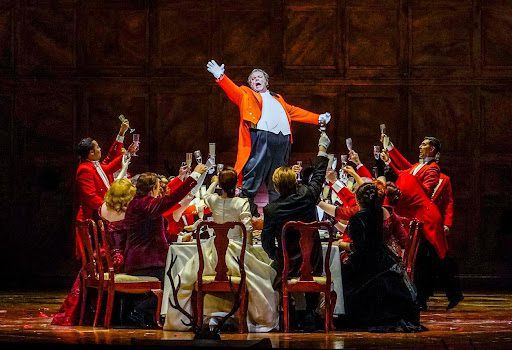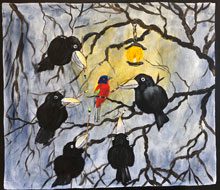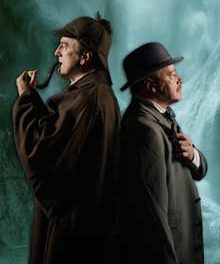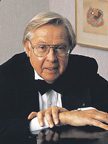By Becky Sprecher
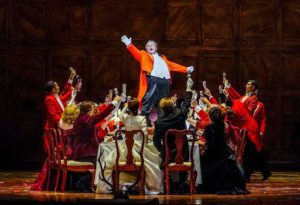 It’s time to laugh. That means it’s time for Falstaff, Giuseppi Verdi’s final work and one of his finest. And not only that, he wrote it when he was a mere 80 years old.
It’s time to laugh. That means it’s time for Falstaff, Giuseppi Verdi’s final work and one of his finest. And not only that, he wrote it when he was a mere 80 years old.
Translating material adapted from Shakespeare into a musical format is no easy task for a composer at any age, and opera history is littered with many failures that were quickly forgotten. In addition to shortening the length of the play and simplifying the plot, there are a great many other challenges to overcome, as David Littlejohn explains in The Ultimate Art: Essays Around and About Opera:
“He (Shakespeare) could make the English language perform magical tricks through newborn diction and lavish imagery, through outrageous insult or tearful understatement … through his ability to interweave the language of many different classes of people and types of people. He was a master plotcrafter who could create characters more subtle and complex (or, when called for, more winningly simple) than those of any other playwright … None of these qualities is readily recapturable or reproducible on the operatic stage.”
But we are talking about Verdi here and like all of the great opera composers, he was primarily a dramatist. This skill would serve him well in crafting a plot that drew chiefly from the “The Merry Wives of Windsor,” but also included material from other Shakespeare sources.
While his two previous efforts at bringing Shakespeare to the stage, MacBeth and Othello, were (and still are) extremely successful, they were pretty much 19th-century Italianized versions of the original plays that were truncated. Says Littlejohn, “It is only in Falstaff that Verdi was able to equal, even occasionally exceed, the rich human comedy of the plays from which he drew.”
Premiering in 1887, Verdi’s original production of Falstaff was set in Windsor, England in the beginning decades of the 15th century. The Met’s production, however, takes place in mid-20th-century England, just after the Second World War when the aristocracy was dwindling, and society was rapidly changing.
The plot is fairly simple. Sir John Falstaff is having a midlife crisis. An aging knight who has enjoyed a life of prodigious self-indulgence, he now finds himself running short of funds. To rectify the situation, he decides to seduce two wealthy young women, Alice Ford and Meg Page, then contrive to seize their husbands’ fortunes.
The ladies, however, are having none of it. When Alice and Beth get wind of all the shenanigans, they band 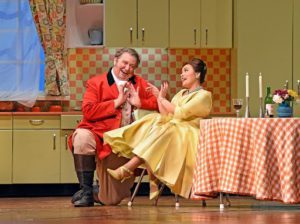 together with a neighbor named Dame Quickly to set in motion a series of hilarious events, one of which results in Falstaff being thrown into the Thames in a laundry basket.
together with a neighbor named Dame Quickly to set in motion a series of hilarious events, one of which results in Falstaff being thrown into the Thames in a laundry basket.
At the opera’s climax, the ladies lure Falstaff to Windsor Park at night, convincing him that seductions are in the offing. But instead, they have concocted a masquerade of witches and fairies who frighten Falstaff, chastise him for his transgressions, and encourage him to repent.
Eventually, he good-naturedly admits that he’s been duped, and acknowledges his short-comings. They all laugh, agree that everything in the world is but a jest, and go off to celebrate.
Falstaff is a tremendously flawed yet likeable character, so it requires a singer of maturity and nuance to pull it off. Michael Volle, an experienced baritone who has had a long career specializing in complex Wagnerian roles such as Wotan in The Ring and Hans Sachs in Die Meistersinger, hits the mark. Volle leans into the humanity of Falstaff, giving us a multi-dimensional portrayal of the knight who one moment is a curmudgeonly buffoon, and the next a spent old man.
Ailyn Pérez as Alice and Jennifer Johnson as Meg more than hold their own with Volle’s Falstaff, but look for contralto Marie-Nicole Lemieux to steal the show as Miss Quickly. Whenever she comes on stage, you know something funny is about to happen.
Verdi departs from his normal musical style with Falstaff in the sense that there are no traditional arias. The music moves from one idea to the next in rapid fashion, but, unlike Wagner, it is still extremely lyrical. Much of the singing takes place in ensembles that are very sophisticated musically but come across as natural conversation. The orchestra also plays an expanded role in commenting on the action and giving us clues as to the inner feelings of the characters.
In Opera Wire, Chris Ruel says of Falstaff: “Verdi gave us a beautiful lesson. At 80 years old, he chose a comedy as his last opera because I think it was the culmination of all he had learned about humility and life. At the end of the opera, when Quickly asks Falstaff how he could’ve possibly believed the two young women would fall in love with him, he shrugs it off, agreeing with her. ‘Yes, yes, you’re right. Ah! But it was fun!’”
So put your tax returns in the mail on April 15, then join us for an afternoon of gorgeous singing and lots of laughter. And by all means raise a glass of wine to Verdi at your post-opera supper. Maybe 80 is the new 60 after all.
Want to Go?
What: Met broadcast of Verdi’s Falstaff
When: 1 p.m., Saturday, April 15
Where: USCB Center for the Arts
Tickets: $22, $20 for OLLI members. Available online at the Center for the Arts website or at the door.
More information: Run length is 2:45, with a 30-minute intermission between Acts II and III. Sung in Italian with MetTitles in English.

